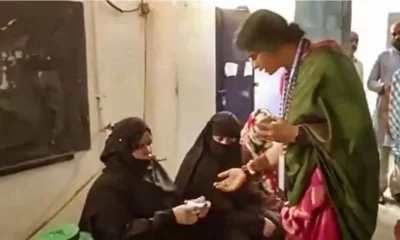[vc_row][vc_column][vc_column_text]A view from the ground
By Rashme Sehgal
What do Muslim women on the ground feel about the issue of triple talaq which they refer to as `teen talaq’? Speaking to a cross-section of Muslim women from the towns of Saharanpur, Muzzafarnagar, Roorkee, Pauri and Dehra Dun provided an unusual insight into this crucial issue which will be heard by the apex court in the weeks to come.
One aspect that becomes obvious is that the plight of Muslim women is very similar to that of their Hindu sisters. Muslim Personal Law is based on the Shariat where marriage is a contract entered between the bride and bridegroom, with the husband announcing a meher for his wife which will be given to her in case the marriage is annulled which can often be the case since Islam permits unilateral divorce.
According to the Quran, the pronouncement of talaq can be uttered three times with intervals of three periods. These correspond to the menstrual cycles of the woman. But there are other Muslims who maintain the Shariat has stipulated a time period of three months between each talaq. Unfortunately, triple talaq is being pronounced over mobile phones, postcards and via the internet and the casual manner in which these words are uttered has raised the ire of the Muslim women.
Thirty-five-year-old sociology postgraduate and mother of two children, Shayara Bano, from Kashipur in Uttarakhand, was so incensed at receiving a verbal divorce from her husband that she decided to challenge the constitutional validity of the Muslim personal law regarding divorce by taking the matter in the Supreme Court.
Late last year, Bano claims she was approached by members of the All India Muslim Personal Law Board who asked her to withdraw her petition from the Supreme Court as it was giving the Muslim community a ‘bad name’ but she declined stating that while she had suffered enormously at the utterance of these ‘three words’ she was fighting to ensure other women did not find themselves in a similar situation.
Dehra Dun-based Gulistan Khanam, who runs an NGO titled Sarvardharam Sadhbhavna Samiti (SSS) says triple talaq is easily misused, citing the shocking example of a 90-year-old Muslim man, Abdul Rehman, who divorced his aged wife on the grounds that “she did not listen to him”!
She also regrets that several detrimental Hindu practices have made their way into Muslim society. The scourge of dowry is now rampant in Muslim households where parents of brides-to-be are expected to provide a car/motorcycle as essential at the time of the marriage, besides a range of electronic items. Woe betide the unfortunate bride who fails to bring these ‘essential’ items. This is a far cry from the nikah or marriage contract, where the groom had to provide a substantial settlement in favour of his wife.
Ruksana Bano from Saharanpur says she was turned out of her marital home by her husband, mother-in-law and sister-in-law for the lack of a big dowry.
Said Ruksana, “No marriage is solemnised if these dowry items are not provided. My in-laws expected me to bring a fridge, a TV set and a car and since my parents failed to provide them, four years into my marriage, my in-laws connived to throw me out. Despite a panchayat being called, my husband has not given me my meher of Rs 30,000.
“In desperation, I have filed a complaint at the Mahila Ayog office. Since my husband never showed up for the hearings, I have also filed a civil case against him. I was divorced by teen talaq. I am relieved that I no longer have to live with my in-laws who had often threatened to burn me alive.”
Burning of brides is on the rise in Muslim households, and records provided by the Allahabad High Court indicate that in the last decade, over 20 per cent of dowry deaths out of 120 cases before them occurred in Muslim homes.
Merissa Begum who presently lives in Dehra Dun was also tortured by her in laws for not bringing an ‘adequate’ dowry and finally her mother-in-law connived to have her thrown out of the house. Fortunately for her, her husband, a tailor by profession, stood by her. They moved to Dehra Dun to escape the torture inflicted upon her by her in-laws.
Said Merissa, “My father owned a small grocery shop which ran into hard times. He did his best for us which obviously was not what my mother-in-law had expected. When I left my in-laws house, I was not allowed to bring any of my personal belongings with me but the saving grace is that my husband supported me.”
The All India Personal Law Board claims that there is less divorce amongst Muslim women than women from other communities. But Gulistan Khanam disagrees with these claims.
Not only does she believe there has been an exponential increase in the number of divorces across all communities but she also believes teen talaq is facilitating the process.
Khanam said, “My experience of working with women in marital conflict during the last decade has shown that there has been a 30 per cent rise in the number of divorces amongst all communities including Muslims.”
Her explanation for this trend may sound clichéd but she is willing to stick her neck out. “There is one breed of husbands who are plain incompetent. They are boozers, they do no work and are not willing to change. Many also have affairs. I once tried to counsel a man in his mid-twenties who was a womaniser. His reply was, ’Hum raat ke shehzada hain; Hindustan azaad hein, hum bhi azaad hein. If my wife does not like my behaviour, she is welcome to leave’.”
It goes without saying that the wife’s increasing protests saw her being served with a triple talaq. However, many wives are not willing to take this punishment lying down.
“When a marriage breaks down, the women opt to file their complaints in the Mahila Aayog (Crime Against Women Cell) and their next step is to file a criminal and civil suit against the husband. These cases can drag on for years but the women are dogged and are determined to fight it out,” said Khanam.
Some Muslim organisations do not accept that there has been an exponential increase in divorce within the community. Executive member of the All India Muslim Personal Law Board, Asma Zehra, has asserted that the incidence of divorce among Muslims is much lower than the prevalence in other communities. Also, women have maintenance rights even after the divorce.
Zehra further pointed out, “Muslim women can also go for remarriage to begin a new life.”
The AIMPLB has gone to the extent of stating in an affidavit submitted to the apex court that if triple talaq is discontinued, men may well resort to murdering or burning their wives in order to get rid of them. In its affidavit, the AIMPLB has even declared that if a serious discord develops between a couple and the husband does not want to live with the wife, legal compulsions of time-consuming separation proceedings and expenses may deter him from taking the legal course. In such instances, he may resort to illegal, criminal ways of murdering or burning her alive the affidavit has stated.
The Muslim community is sharply divided on this issue. Khanam cites the example of some women who are not able to reconcile with the reality that their husbands have deserted them and found other women for themselves.
Sometimes a man takes a second wife but refuses to divorce the first one. Islam permits men to have four wives. The first wife finds herself in a bind. Islam permits her to ask for divorce in the form of ‘khula’ but she has to forgo her ‘meher’. Further, there is social disapproval and maulvis often make it difficult by demanding money from her to grant the divorce.
It is clear that these festering issues need to be addressed urgently. Activists believe the government, the courts and society can no longer turn a blind eye to the plight of women suffering due to this practice. Since the community and its leadership have been unable to resolve the issue, the remedy lies in the courts.
As Noorjehan Safia Niaz, co-founder of Bharatiya Muslim Mahila Andolan (BMMA), and a petitioner in the Supreme Court against triple talaq, has pointed out, “No one can stop the citizen of this country from approaching the court. That is a right Muslim women also have.”
Lead Photo by UNI[/vc_column_text][/vc_column][/vc_row]


 Latest world news11 hours ago
Latest world news11 hours ago
 Latest world news11 hours ago
Latest world news11 hours ago
 India News11 hours ago
India News11 hours ago
 Latest world news10 hours ago
Latest world news10 hours ago
 India News10 hours ago
India News10 hours ago















